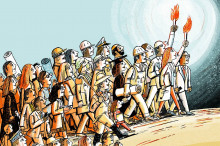For many, “The Enlightenment” is little more than a forgotten term from our history books. Some of us might remember that The Enlightenment was an intellectual and philosophical movement that dominated the world of ideas in Europe during the 18th century. But most of us would argue that in today’s world isn’t one that feels much like The Enlightenment.
Not so says Steven Pinker, author of “The Better Angels of Our Nature: Why Violence Has Declined,” and more recently, Enlightenment Now: The Case for Reason, Science, Humanism, and Progress.” Here’s how he opens his article in the Wall Street Journal:
For all their disagreements, the left and the right concur on one thing: The world is getting worse. Whether the decline is visible in inequality, racism and pollution, or in terrorism, crime and moral decay, both sides see profound failings in modernity and a deepening crisis in the West. They look back to various golden ages when America was great, blue-collar workers thrived in unionized jobs, and people found meaning in religion, family, community and nature.
Such gloominess is decidedly un-American. The U.S. was founded on the Enlightenment ideal that human ingenuity and benevolence could be channeled by institutions and result in progress. This concept may feel naive as we confront our biggest predicaments, but we can only understand where we are if we know how far we’ve come.
You can always fool yourself into seeing a decline if you compare rose-tinted images of the past with bleeding headlines of the present. What do the trajectories of the nation and world look like when we measure human well-being over time with a constant yardstick? Let’s look at the numbers (most of which can be found on websites such as OurWorldinData, HumanProgress and Gapminder).
Consider the U.S. just three decades ago. Our annual homicide rate was 8.5 per 100,000. Eleven percent of us fell below the poverty line (as measured by consumption). And we spewed 20 million tons of sulfur dioxide and 34.5 million tons of particulate matter into the atmosphere.
Fast forward to the most recent numbers available today. The homicide rate is 5.3 (a blip up from 4.4 in 2014). Three percent of us fall below the consumption poverty line. And we emit four million tons of sulfur dioxide and 20.6 million tons of particulates, despite generating more wealth and driving more miles.
Are the ideals of the Enlightenment too tepid to engage our animal spirits? Is the conquest of disease, famine, poverty, violence and ignorance … boring? Do people need to believe in magic, a father in the sky, a strong chief to protect the tribe, myths of heroic ancestors?
I don’t think so. Secular liberal democracies are the happiest and healthiest places on earth, and the favorite destinations of people who vote with their feet. And once you appreciate that the Enlightenment project of applying knowledge and sympathy to enhance human flourishing can succeed, it’s hard to imagine anything more heroic and glorious.
Want more? You can read the full article here


